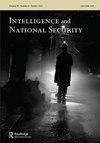真实的剧院:勒卡雷的《小裁缝兵间谍》和《小鼓手女孩》中的演员/间谍关系
IF 0.8
3区 社会学
Q1 HISTORY
引用次数: 0
摘要
摘要本文以《小裁缝兵谍影》(1974)和《小鼓手女孩》(1983)为个案,探讨了勒卡雷作品中的戏剧性和演员形象。此外,它还将分析这两部小说中演员和表演的重要性,以及它与当时“现实世界”间谍活动的关系。它还将研究演员/间谍关系是如何在改编自勒卡雷作品的电影和电视中得到解决的,该作品改编自《小叮当裁缝兵间谍》(2011年)和《小鼓手女孩》(2018年)。本文章由计算机程序翻译,如有差异,请以英文原文为准。
The theatre of the real: the actor/spy relationship in le Carré’s Tinker Tailor Soldier Spy and The Little Drummer Girl
ABSTRACT This article examines the representations of theatricality and the actor in le Carré’s work, using Tinker Tailor Soldier Spy (1974) and The Little Drummer Girl (1983) as case studies. Additionally, it will analyse the importance of the actor and performance in these two novels, and how it relates to the 'real world' practice of espionage at the time. It will also examine how the actor/spy relationship has been addressed in film and television adaptations of le Carré’s work, drawing from Tinker Tailor Soldier Spy (2011) and The Little Drummer Girl (2018).
求助全文
通过发布文献求助,成功后即可免费获取论文全文。
去求助
来源期刊

Intelligence and National Security
Multiple-
CiteScore
1.80
自引率
41.70%
发文量
93
期刊介绍:
Intelligence has never played a more prominent role in international politics than it does now in the early years of the twenty-first century. National intelligence services are larger than ever, and they are more transparent in their activities in the policy making of democratic nations. Intelligence and National Security is widely regarded as the world''s leading scholarly journal focused on the role of intelligence and secretive agencies in international relations. It examines this aspect of national security from a variety of perspectives and academic disciplines, with insightful articles research and written by leading experts based around the globe. Among the topics covered in the journal are: • the historical development of intelligence agencies • representations of intelligence in popular culture • public understandings and expectations related to intelligence • intelligence and ethics • intelligence collection and analysis • covert action and counterintelligence • privacy and intelligence accountability • the outsourcing of intelligence operations • the role of politics in intelligence activities • international intelligence cooperation and burden-sharing • the relationships among intelligence agencies, military organizations, and civilian policy departments. Authors for Intelligence and National Security come from a range of disciplines, including international affairs, history, sociology, political science, law, anthropology, philosophy, medicine, statistics, psychology, bio-sciences, and mathematics. These perspectives are regularly augmented by research submitted from current and former intelligence practitioners in several different nations. Each issue features a rich menu of articles about the uses (and occasional misuses) of intelligence, supplemented from time to time with special forums on current intelligence issues and interviews with leading intelligence officials.
 求助内容:
求助内容: 应助结果提醒方式:
应助结果提醒方式:


